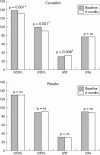Effects of carvedilol on left ventricular remodelling in chronic stable heart failure: a cardiovascular magnetic resonance study
- PMID: 15201244
- PMCID: PMC1768304
- DOI: 10.1136/hrt.2003.015552
Effects of carvedilol on left ventricular remodelling in chronic stable heart failure: a cardiovascular magnetic resonance study
Abstract
Background: The ability of beta blockers to improve left ventricular function has been demonstrated, but data on the effects on cardiac remodelling are limited.
Objective: To investigate, using cardiovascular magnetic resonance (CMR), the effects of carvedilol on left ventricular remodelling in patients with chronic stable heart failure and left ventricular systolic dysfunction caused by coronary artery disease.
Design: Randomised, double blind, placebo controlled study.
Setting: Chronic stable heart failure.
Patients and intervention: 34 patients with chronic stable heart failure and left ventricular systolic function taking part in the CHRISTMAS trial (double blind carvedilol v placebo) underwent CMR before randomisation and after six months of treatment.
Main outcome measure: Left ventricular remodelling at six months.
Results: The carvedilol and placebo groups were well balanced at baseline, with no significant intergroup differences. Over the study period, there was a significant reduction in end systolic volume index (ESV(I)) and end diastolic volume index (EDV(I)) between the carvedilol and the placebo group (carvedilol -9 v placebo +3 ml/m2, p = 0.0004; carvedilol -8 v placebo 0 ml/m2, p = 0.05). The ejection fraction increased significantly between the groups (carvedilol +3% v placebo -2%, p = 0.003).
Conclusions: Treatment of chronic stable heart failure with carvedilol results in significant improvement in left ventricular volumes and function. These effects might contribute to the benefits of carvedilol on mortality and morbidity in patients with chronic heart failure.
Figures

References
-
- Olsen S L, Gilbert EM, Renlund DG, et al. Carvedilol improves left ventricular function and symptoms in chronic heart failure: a double-blind randomised study. J Am Coll Cardiol 1995;25:1225–31. - PubMed
-
- Packer M , Bristow MR, Cohn JN, et al. for the US carvedilol heart failure study group. The effect of carvedilol on morbidity and mortality in patients with chronic heart failure. N Engl J Med 1996;334:1349–5. - PubMed
-
- Australia/New Zealand Heart Failure research Collaborative Group. Effects of carvedilol in patients with congestive heart failure due to ischaemic heart disease: final results from the ANZ heart failure research collaborative trial. Lancet 1997;349:212–18. - PubMed
-
- Waagstein F , Bristow MR, Swedberg K, et al. for the Metoprolol in Dilated Cardiomyopathy trial Study Group. Beneficial effects of metoprolol in idiopathic dilated cardiomyopathy. Lancet 1993;342:1441–6. - PubMed
-
- CIBIS Investigators and Committees. A randomised trial of B-blockade in heart failure: the cardiac insufficiency bisoprolol study. Circulation 1994;90:1765–73. - PubMed
Publication types
MeSH terms
Substances
LinkOut - more resources
Full Text Sources
Medical
